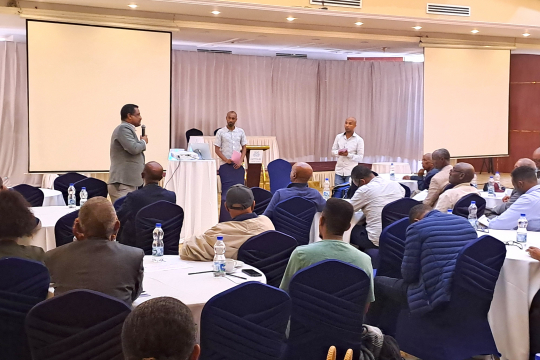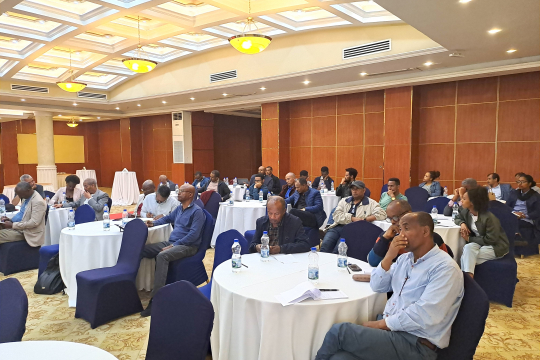EfD Ethiopia hosted, in partnership with the Ethiopia Clean Cooking Alliance (ECCA), the 75th round of its Talk Energy Ahead (TEA) series in Addis Ababa on October 19. The discussion focused on Financial Access and Tax Incentives for Clean Cooking Transition in Ethiopia, based on the transformation initiatives developed by fellows from the 2023 Inclusive Green Economy (IGE) in Practice Program, a capacity development program for senior civil servants in Eastern Africa. The participants agreed on several recommended actions.
This important meeting involved experts from the government, producers, manufacturers, importers, consultants, research, and universities.
Dr. Abebe D. Beyene, Center Director of EfD Ethiopia, emphasized in his opening remarks, the critical role of private sector engagement in fostering sustainable energy solutions. He stated that by establishing the right policy environment and financial incentives, Ethiopia can stimulate investments, drive innovation, and enhance the affordability of clean cooking technologies.
82% rely on biomass
Abebe Beyene highlighted that this initiative is an environmental necessity and vital for public health, gender equity, and inclusive economic development, underscoring the long-term implications for future generations.
Mr. Abrham Tessema, a 2023 IGE fellow and Partnership Development Expert at the Ministry of Water and Energy, pointed out that despite Ethiopia's rich renewable energy resources, over 82% of the population still depends on traditional biomass fuels for cooking. This reliance contributes to deforestation, greenhouse gas emissions, and indoor air pollution. He noted that while improved cookstoves could yield significant benefits adoption rates still remain low, below 10% of the total population in the country.
Financial incentives are needed
Abrham Tessema explained the advantages of tax exemptions on clean cooking technologies to encourage private sector involvement in their production, import, and distribution. On the demand side, this policy will make clean cooking technologies more accessible and affordable to consumers. He concluded that tax exemptions play a crucial role in overcoming barriers to private sector engagement and accelerating the adoption of clean cooking technologies, aligning with Ethiopia's sustainable development goals.
Mr. Tagay Hamza, another 2023 IGE fellow and Climate Change Expert at the Ministry of Water and Energy, also highlighted the importance of addressing financing challenges to support Ethiopia's transition to sustainable energy. He noted that despite government efforts, significant supply-side and demand-side barriers remain for the private sector in accessing finance for clean cooking technologies. He recommended establishing Result-Based Financing (RBF) programs, developing carbon markets, public-private partnerships (PPP), and providing low-interest financing options through various financial institutions.
Discussions increased understanding
The participants appreciated the two transformation initiatives and commended the team for their efforts to promote clean cooking in Ethiopia. In addition, they highlighted that the collaborative discussions and the diverse perspectives brought together have enriched the understanding of the challenges and opportunities in this vital sector. The participants in the meeting agreed on several recommended actions:
- Strengthen collaboration between the private sector, universities, and government to facilitate the adoption of clean cooking technologies;
- Present a summary of the discussions, the policy brief, and the two transformation initiatives to relevant government stakeholders for implementation. Ensure integration of the recommendations from the two papers into government policies and strategies to support the private sector;
- In addition to tax incentives and access to finance, there is a need to provide comprehensive support to existing private sector entities in the clean cooking sector such as capacity building and experience sharing;
- Ensure that the government and other stakeholders play their roles in implementing tax exemptions and enhancing access to finance;
- Improve the accessibility of information and data produced by both the government and the private sector; and
- Consider additional local tax exemption tools, such as tax holidays and profit tax exemptions, alongside current TOT and VAT exemptions.
Finally, the participants expressed that they look forward to translating the recommendation into action to drive meaningful change in our country.
Read more about the Inclusive Green Economy (IGE) program here.
By: Asaye Ketema.


